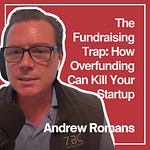I recently had the pleasure of speaking with Silicon Valley investor Marvin Liao on my podcast. Marvin has a wealth of experience spanning over 20 years in the tech industry. He was an early team member at Yahoo, helped expand the company to over 45 countries, and has invested in over 400 startups.
In our far-reaching conversation, we covered everything from the key moments that shaped Marvin's career path, to his thoughts on the "dark side" of Silicon Valley, common founder mistakes, and the evolving role of startup accelerators. Marvin offered candid reflections on his biggest failures and regrets, as well as advice he wishes he could give his younger self.
Throughout our discussion, Marvin provided unique insights only someone with his breadth of experience could share. I wanted to highlight some of the key takeaways in this post.
"The deals I've done best in were non-consensus deals that not many VCs understood." — Marvin Liao
Marvin's Background and Career Journey
Marvin has an interesting background, having studied history in university before transitioning into the tech industry in the late 90s. He joined Yahoo in 2001 after the startup he was working at imploded during the dot-com crash. At Yahoo, Marvin helped expand the company to over 45 countries during his 10+ years there.
After leaving Yahoo, Marvin spent two years angel investing and serving on boards. This is when we first met back in 2012. He then joined 500 Startups, running their San Francisco office and core accelerator program for 6 years. Most recently, Marvin has been focused full-time on early stage investing through his own rolling VC fund, Diaspora Ventures.
The Dark Side of Silicon Valley
According to Marvin, Silicon Valley has a tendency to gloss over the harsh realities most founders face. In truth, building a successful startup is brutally difficult - 90-95% will fail. You rarely hear about all the pivots, co-founder fallouts, and lack of progress behind most “overnight” startup success stories.
Marvin believes Silicon Valley sets unrealistic expectations that it's easy to raise funding and scale a company quickly. In reality, it's never been easy and the path is filled with challenges at every turn.
Biggest Regrets and Advice to His Younger Self
When I asked Marvin what he would do differently when it comes to work-life balance and family, he offered some thoughtful reflections. He admits putting too much focus on his career in his 20s and wishes he made more time for fun and family.
In retrospect, Marvin doesn’t believe you can “have it all.” You have to make tough choices and prioritize work or family at different seasons. The only way he could have learned this was through experience. His advice to his younger self would be to not take his 20s so seriously and optimize less for career achievements.
Common Founder Mistakes
Based on his vast experience, Marvin highlighted a few key mistakes he sees first-time founders make:
- Not asking for advice or help from investors and disappear when things go badly
- Poor communication skills, especially not keeping investors updated during tough times
- Arrogance and unwillingness to seek truth from multiple perspectives
He believes the best founders regularly ask for help, take investor feedback seriously, and are transparent with updates during good and bad times.
The Evolving Role of Startup Accelerators
Marvin reflected on how startup accelerators like Y Combinator and 500 Startups have changed over time. He believes their core value of connecting founders and fostering peer learning is still relevant. However, most programs have deteriorated after going virtual during COVID.
In his view, the accelerator industry has matured and their importance has diminished as more resources and experienced founders emerge. But top programs like YC that prioritize an in-person founder community will continue to thrive.
"The best founders regularly ask for help and take investor feedback seriously." — Marvin Liao
Why Silicon Valley is Hard to Replicate
When asked why governments often fail at replicating Silicon Valley, Marvin pointed to the ecosystem's magical combination of historical accidents and favorable circumstances. From its early roots in military and academia to having top universities and a critical mass of talent, Silicon Valley's network effects developed organically over decades.
He says governments mistakenly think replicating parts of Silicon Valley like funding startups or building a university will create the same results. In reality, it was many unique factors coming together that led to Silicon Valley's rise.
Marvin's Recommendations
Throughout our conversation, Marvin mentioned several books, podcasts and founders that have inspired him over the years. A few he specifically highlighted were:
- Books: Poor Charlie’s Almanack by Charlie Munger, Die With Zero by Bill Perkins
- Podcasts: Invest Like the Best, The Twenty Minute VC, The Pitch
- Founders: Patrick McKenzie (Patio11), Alex Taub, Laura Behrens Wu
I'm grateful to Marvin for openly sharing his remarkable journey and wealth of hard-earned knowledge. His transparency illustrates why experience is often the best teacher. Marvin's thoughts highlight important lessons for anyone thinking of diving into the exhilarating but often brutal world of startups.
Special thanks to Marvin for joining me on the podcast and imparting his wisdom. I look forward to our conversations ahead.















Share this post